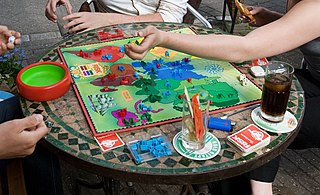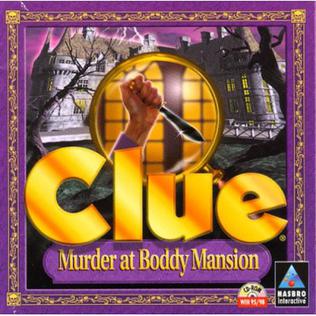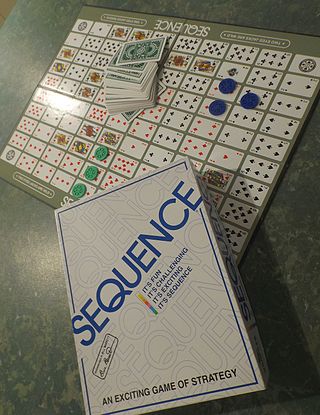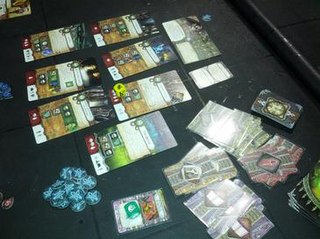
Poker is a family of comparing card games in which players wager over which hand is best according to that specific game's rules. It is played worldwide, but in some places the rules may vary. While the earliest known form of the game was played with just 20 cards, today it is usually played with a standard deck, although in countries where short packs are common, it may be played with 32, 40 or 48 cards. Thus poker games vary in deck configuration, the number of cards in play, the number dealt face up or face down, and the number shared by all players, but all have rules that involve one or more rounds of betting.

Risk is a strategy board game of diplomacy, conflict and conquest for two to six players. The standard version is played on a board depicting a political map of the world, divided into 42 territories, which are grouped into six continents. Turns rotate among players who control armies of playing pieces with which they attempt to capture territories from other players, with results determined by dice rolls. Players may form and dissolve alliances during the course of the game. The goal of the game is to occupy every territory on the board and, in doing so, eliminate the other players. The game can be lengthy, requiring several hours to multiple days to finish. European versions are structured so that each player has a limited "secret mission" objective that shortens the game.

Clue is a 1998 video game based on the board game of the same name. It is also known as Clue: Murder at Boddy Mansion or Cluedo: Murder at Blackwell Grange, depending on whether the country of release used American or British English.

Spades is a trick-taking card game devised in the United States in the 1930s. It can be played as either a partnership or solo/"cutthroat" game. The object is to take the number of tricks that were bid before play of the hand began. Spades is a descendant of the Whist family of card games, which also includes Bridge, Hearts, and Oh Hell. Its major difference as compared to other Whist variants is that, instead of trump being decided by the highest bidder or at random, the Spade suit always trumps, hence the name.

Sorry! is a board game that is based on the ancient Indian cross and circle game Pachisi. Players move their three or four pieces around the board, attempting to get all of their pieces "home" before any other player. Originally manufactured by W.H. Storey & Co in England and now by Hasbro, Sorry! is marketed for two to four players, ages 6 and up. The game title comes from the many ways in which a player can negate the progress of another, while issuing an apologetic "Sorry!"

Lost Cities is a 60-card card game, designed in 1999 by game designer Reiner Knizia and published by several publishers. The objective of the game is to mount profitable expeditions to one or more of the five lost cities. The game was originally intended as a 2-player game, but rule variants have been contributed by fans to allow 1 or 2 further players, causing Reiner Knizia himself to later provide semi-official 4-player rules.

The Yu-Gi-Oh! Trading Card Game is a collectible card game developed and published by Konami. It is based on the fictional game of Duel Monsters created by manga artist Kazuki Takahashi, which appears in portions of the manga franchise Yu-Gi-Oh! and is the central plot device throughout its various anime adaptations and spinoff series.

Spider is a type of patience game, and is one of the more popular two-deck solitaire games. The game originates in 1949, and its name comes from a spider's eight legs, referencing the eight foundation piles that must be filled to win the game.

Sequence is an abstract strategy tabletop party game. Sequence was invented by Douglas Reuter and Hamish. They originally called the game Sequence Five. He spent years developing the concept, and, in June 1981, granted Jax Ltd. an exclusive license to manufacture, distribute and sell the board game Sequence and its subsequent variations. The game was first sold in a retail store in 1982. In 2017, Goliath Game Company bought Jax, and in early 2018 also bought all licensor rights and now owns 100% of the game Sequence. Doug Reuter is acknowledged as the inventor of Sequence on all newly produced copies of the game - both on the box and in the printed rules.
Pitch is the American name of the English trick-taking game of Blind All Fours which, in turn, is derived from classic All Fours. Historically, Pitch started as "Blind All Fours", a very simple All Fours variant that is still played in England as a pub game. The modern game involving a bidding phase and setting back a party's score if the bid is not reached came up in the middle of the 19th century and is more precisely known as Auction Pitch or Setback.

Rugrats: Scavenger Hunt is an interactive board video game developed by Realtime Associates for the Nintendo 64. It was published by THQ in 1999. The game is based on the Nickelodeon animated television series Rugrats, which aired on the network from 1991 to 2004. It features the original voices from the Rugrats cast reprising their roles as Tommy Pickles, Chuckie Finster, and Phil and Lil DeVille as well as supporting characters Grandpa Lou, Didi and Stu Pickles, Reptar, and series antagonist Angelica Pickles.

Uno is a video game based on the card game of the same name. It has been released for a number of platforms. The Xbox 360 version by Carbonated Games and Microsoft Game Studios was released on May 9, 2006, as a digital download via Xbox Live Arcade. A version for iPhone OS and iPod devices was released in 2008 by Gameloft. Gameloft released the PlayStation 3 version on October 1, 2009, and also released a version for WiiWare, Nintendo DSi via DSiWare, and PlayStation Portable. An updated version developed by Ubisoft Chengdu and published by Ubisoft was released for the PlayStation 4 and Xbox One in August 2016, Microsoft Windows in December 2016 and for the Nintendo Switch in November 2017.

Robot Rascals is a hybrid digital/analog game by Ozark Softscape and published by Electronic Arts in 1986 for the Apple II, Commodore 64, and IBM PC compatibles. Robot Rascals is a multiplayer-only scavenger hunt for people at a single computer. It uses physical cards as part of the game. Design is credited to Danielle Bunten Berry.

Magic: The Gathering is a video game published by MicroProse in March 1997 based on the collectible card game Magic: The Gathering. It is often referred to as Shandalar after the plane of Shandalar, where the game takes place. The player must travel the land and fight random enemies to gain cards, and defeat five wizards representing the five colors. The player must prevent one color from gaining too much power, and defeat the planeswalker Arzakon, who has a deck of all five colors. Adventure and role-playing elements are present, including inventory, gold, towns, dungeons, random battles, and character progression in the form of new abilities and a higher life point total. An oversized version of Aswan Jaguar was included in the game box.

Warrior Knights is a board game for 2–6 players originally published by Games Workshop in 1985, and later published by Fantasy Flight Games in 2006. Each player takes the role of a Baron vying to claim the throne of an unnamed kingdom. Gameplay revolves around raising an army, obtaining enough money to maintain that army, and gaining influence through a variety of means.

Magic: The Gathering – Duels of the Planeswalkers is a video game based on the popular collectible card game of the same name, published by Wizards of the Coast. It was released on June 17, 2009.
The fictional universe of the Discworld novels by Terry Pratchett features a number of invented games, some of which have gone on to spawn real-world variants.

Elder Sign is a cooperative card and dice game, based on the Cthulhu Mythos of horror writer H.P. Lovecraft and Chaosium's Call of Cthulhu roleplaying game. It is published by Fantasy Flight Games, which also produces the Cthulhu Mythos games Arkham Horror, Call of Cthulhu: The Card Game, Mansions of Madness, and Eldritch Horror.

Hearthstone is a digital collectible card game released by Blizzard Entertainment in 2014, available for Microsoft Windows and macOS PCs and iOS and Android smartphones. The game is free-to-play, with players gaining in-game currency and card packs via winning matches and completing quests, while real-world money can be spent to acquire additional card packs and cosmetic items. The game has been critically well-received and financially successful, estimated in August 2017 to earn nearly US$40 million per month. As of November 2018, Blizzard has reported more than 100 million Hearthstone players. Blizzard has continued to expand the game with the addition of multiple expansions, adventures and game modes.

















